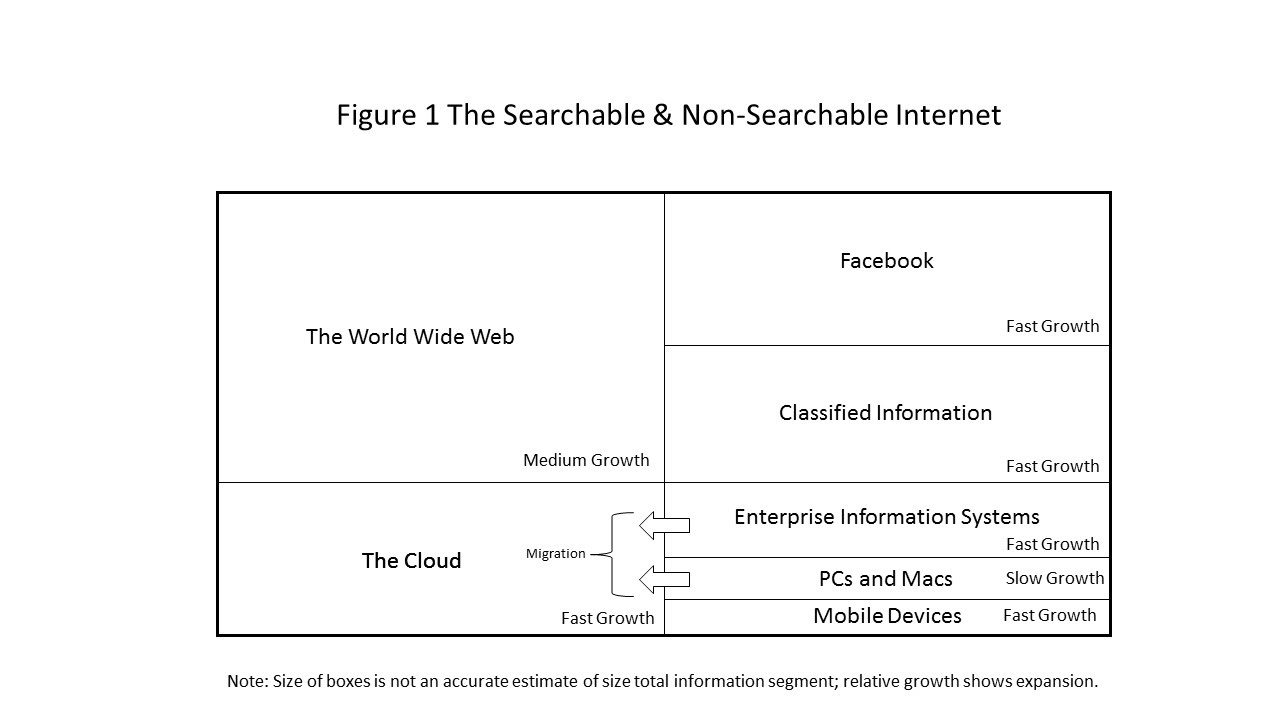Gerry Purdy looks at the complex world of web search and finds there are actually places outside the reach of Google and Bing
You can search the contents of your PC or Mac, but not easily search the contents of your mobile device. You can search for websites, but not easily the contents of those sites. We all use a number of different search tools every day that are actually quite different from each other.
Most of us have been using Google’s search engine for a long time with, more recently, Microsoft’s Bing. It’s a great tool for finding sites on the web. There are millions of websites with a far larger number of webpages. Google and Bing are designed to “crawl” through the web to find newly added websites and add them to the index of already existing sites. Google uses their index to quickly find sites when users present a search request.
But, have you ever stopped to think about what Google and Bing cannot do? There is a substantial amount of information that is not available to Google or Bing in which to search. Some of the different kinds of information that is not searchable by Google or Bing include, but is not limited to, the following:
• Facebook – Facebook does not allow Google or Bing (or any other search engine’s web crawler) to go through Facebook’s information. Why? Because Google and Bing sell advertising, which is Facebook’s primary source of revenue. Thus, Facebook has developed their own search engine to provide search results only to their 1.5 billion members.
• Many classified government information systems are often not connected to the Internet. Searching through these databases is specific to the database system and other custom search engines.
• Corporate cloud environments – these are mostly closed environments to public search since the cloud environments are holding proprietary information for a defined set of users and their local apps.
• Enterprise information systems – these include corporate human resources and finance systems and other information systems used within a company’s environment.
• PCs and Macs – You can’t use your web browser to search for local information on your PC or Mac.
• Mobile devices – With iPhones and iPads now holding hundreds of gigabytes of information, the information is not searchable by Google or Bing or by any other search method (further explained below).
You can see this summarized diagrammatically in Figure 1.

While it is difficult to estimate the actual size of the different information segments, the relative growth of the segments can be estimated. There are some interesting things to observe from this diagram and its implications for the future of search:
1. Facebook and the other information segments usually have their own search engines either developed internally (e.g. Facebook) or licensed from companies like SRCH2. There is a great opportunity for search methodology in these markets.
2. The size of the information segments outside of the web will at some point surpass the size of the web. That might be true today, but if not, it will be at some point. Searching across all these segments is, of course, impossible.
3. There is good local search available on PCs and Macs via Windows File Explorer on PCs and Finder on Macs. This is due to the rich, underlying file system inherent in both PCs and Macs. There are also good search techniques in local apps, e.g. ability to search the contents of a Word document.
4. However, general search across mobile devices is not provided today because these operations systems (iOS, Android) do not have a file system like the ones that are available on PCs and Macs.
5. While enterprise information was all internally hosted for many years, there’s a trend to migrate enterprise information to the cloud using security and partitions to retain a secure environment. There are tools to provide enterprises with search capability such as SRCH2 mentioned above, database search tools and local search when various files are opened.
6. Classified information includes all proprietary information retained by governments. Some of it gets hacked by terribly simple techniques such as an outsider obtaining legally or illegally someone’s user name and password. Just think of the size of the databases retained by the IRS, Social Security, NSA, the FBI and the CIA.
It’s interesting that the concept of searching for information has been around for a long time, but search has had to be adapted to the new information systems that have been created. For example, when the web was created, a new search technology called the web browser search had to be created.
So when you next need to find information, realize there’s an entire family of search tools that enable you to find the information for which you are searching.

J. Gerry Purdy, Ph.D. is the principal analyst with Mobilocity LLC and a research affiliate with Frost & Sullivan. He is a nationally recognized industry authority who focuses on monitoring and analyzing emerging trends, technologies, and market behavior in mobile computing and wireless data communications devices, software and services. Dr. Purdy is an “edge of network” analyst looking at devices, applications and services as well as wireless connectivity to those devices. Dr. Purdy provides critical insights regarding mobile and wireless devices, wireless data communications, and connection to the infrastructure that powers the data in the wireless handheld. Dr. Purdy continues to be affiliated with the venture capital industry as well. He spent five years as a venture advisor for Diamondhead Ventures in Menlo Park where he identified, attracted and recommended investments in emerging companies in the mobile and wireless industry. He has had a prior affiliation with East Peak Advisors and, subsequently, following their acquisition, with FBR Capital Markets. Dr. Purdy advises young companies who are preparing to raise venture capital. Dr. Purdy has been a member of the Program Advisory Board of the Consumer Electronics Association that produces CES, one of the largest trade shows in the world. He is a frequent moderator at CTIA conferences and GSM Mobile World Congress. Prior to funding Mobilocity, Dr. Purdy was chief mobility analyst with Compass Intelligence. Prior to that, he owned MobileTrax, LLC and enjoyed successful stints at Frost & Sullivan, Dataquest (a division of Gartner) among other companies.
Editor’s Note: Welcome to Analyst Angle. We’ve collected a group of the industry’s leading analysts to give their outlook on the hot topics in the wireless industry.

